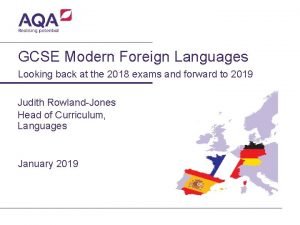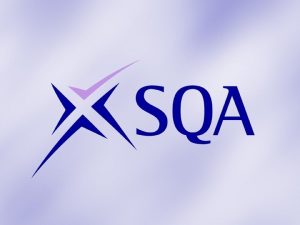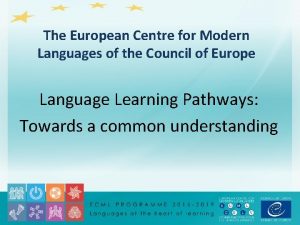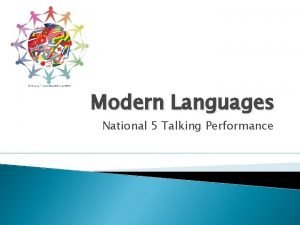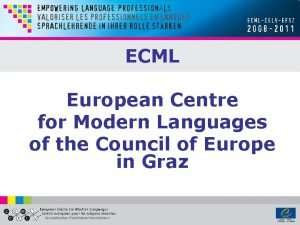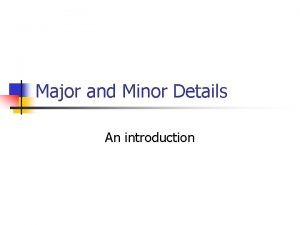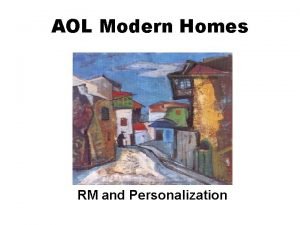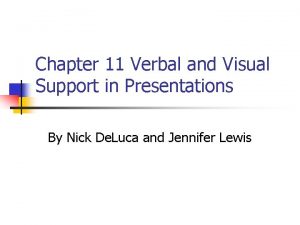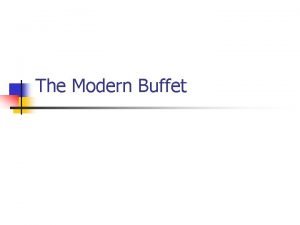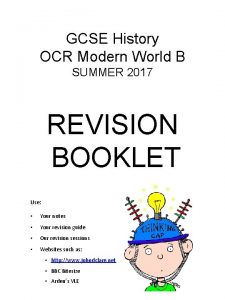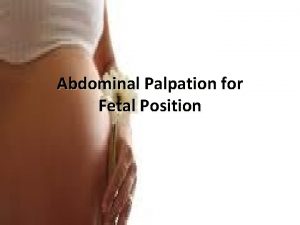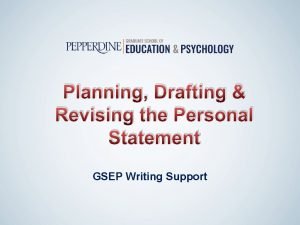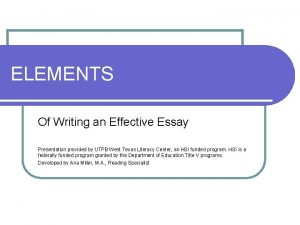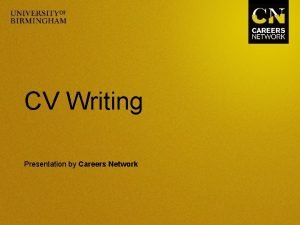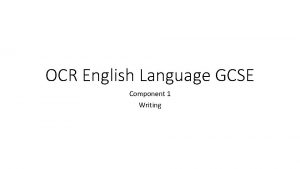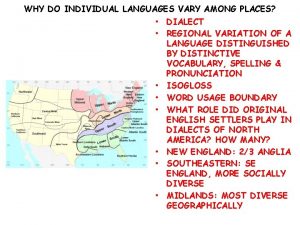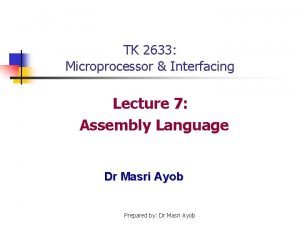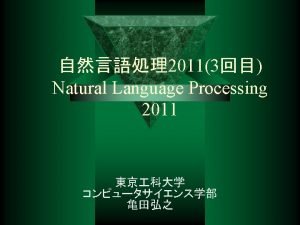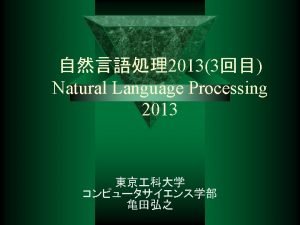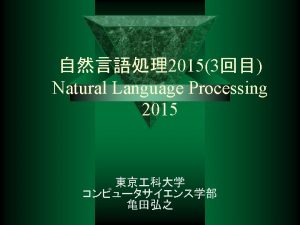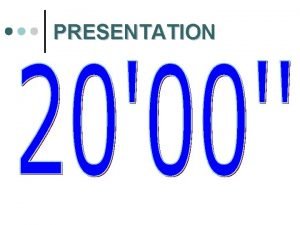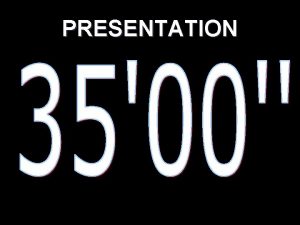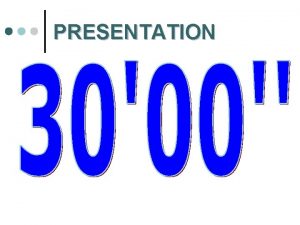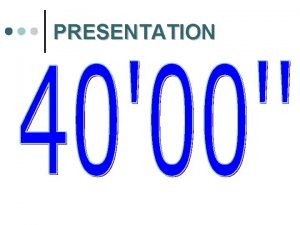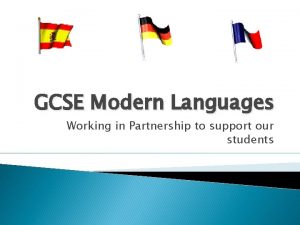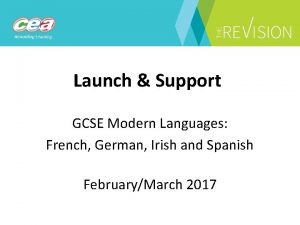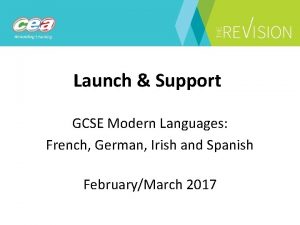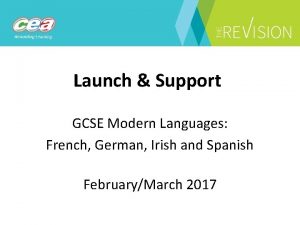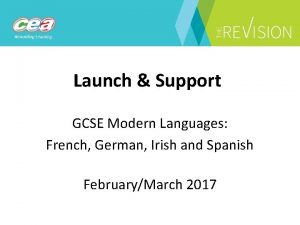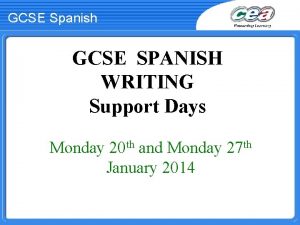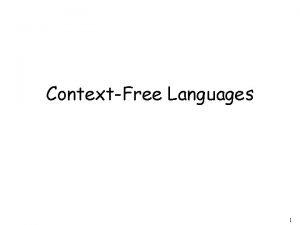GCSE Modern Languages GCSE WRITING Support presentation GCSE


















- Slides: 18

GCSE Modern Languages GCSE WRITING Support presentation

GCSE Modern Languages What should tasks be based on? • Most popular topics- family, school, holidays, local environment • Others include environment, health, work, leisure • Topics need to be accessible

GCSE Modern Languages How many bullet points should there be? • 200 -300 words a suggested guideline though candidates can write more • Those aiming for A*- C 200 - 300 words D – G 100 – 150 words • 5 points favoured by most centres • Fewer means candidates must write more • More might not allow enough development

GCSE Modern Languages What should these bullet points contain? • • • Need for variety Need for balance when produced Should not be overloaded Should not be too limited Should be written in order if possible Opinion throughout but could be focus of a point e. g. My opinion of the holiday.

GCSE Modern Languages Should all bullet points be covered? • Yes, failure to do so will impact on the marks for Communication and Grammar & Structures

GCSE Modern Languages Informative/Comparative/Persuasive writing • There should be 2 from the 3 above in the two pieces submitted • A comparative/persuasive piece does not mean that all bullet points are of this type • Try to integrate the comparative / persuasive elements into the task

GCSE Modern Languages Communication KEY IDEAS • clarity • development • relevance

GCSE Modern Languages BAND 5 - Communication • The candidate communicates the task very clearly and concisely and displays a very good knowledge of the topic. Ideas and opinions are expressed and justified.

GCSE Modern Languages BAND 4 - Communication • The candidate communicates the task clearly and concisely and displays a good knowledge of the topic. Ideas and opinions are expressed and there is some justification.

GCSE Modern Languages BAND 3 - Communication • The candidate communicates the task and displays some knowledge of the topic. Some ideas and opinions are expressed.

GCSE Modern Languages BAND 2 - Communication • The candidate communicates some of the task and displays a limited knowledge of the topic. There are few ideas and opinions.

GCSE Modern Languages BAND 1 - Communication • The candidate does not communicate the task and displays very limited knowledge of the topic. No ideas or opinions are expressed.

GCSE Modern Languages GRAMMAR & STRUCTURES • • • Assess overall proportion which is accurate “idiomatic language” = quality of language “structures” include tenses Minor errors Major errors

GCSE Modern Languages BAND 5 GRAMMAR & STRUCTURES • There are few errors. The writing is well ordered and coherent. The candidate uses a wide variety of vocabulary and structures. There is good evidence of idiomatic language.

GCSE Modern Languages BAND 4 GRAMMAR & STRUCTURES • There are some errors where more complex language is used. The writing is likely to have a natural flow. The candidate uses a range of vocabulary and structures. There is some evidence of idiomatic language.

GCSE Modern Languages BAND 3 – GRAMMAR & STRUCTURES • There are frequent minor errors but the majority of the task is comprehensible. The candidate uses a limited range of vocabulary and structures. There is little evidence of idiomatic language.

GCSE Modern Languages BAND 2 – GRAMMAR & STRUCTURES • There are frequent major and minor errors, but up to half of the text is meaningful. The candidate uses basic vocabulary and structures. There is no evidence of idiomatic language.

GCSE Modern Languages BAND 1 – GRAMMAR & STRUCTURES • There are major and frequent errors, making the text ambiguous and difficult to understand. The candidate uses short, simple sentences or phrases but there are many inaccuracies in spelling.
 Gcse modern foreign languages
Gcse modern foreign languages Languages for life and work
Languages for life and work European center for modern languages
European center for modern languages National 5 modern languages talking performance
National 5 modern languages talking performance European center for modern languages
European center for modern languages Major details and minor details
Major details and minor details Modern housing remote support
Modern housing remote support Verbal and visual support in presentation
Verbal and visual support in presentation Modern buffet presentation
Modern buffet presentation How useful is this source
How useful is this source Diameters of fetal head
Diameters of fetal head Cephalic presentation
Cephalic presentation Gsep writing support
Gsep writing support Essay writing presentation
Essay writing presentation Cv writing presentation
Cv writing presentation Gcse speech example
Gcse speech example How do individual use languages vary among places
How do individual use languages vary among places Assembly languages list
Assembly languages list Multithreaded programming language
Multithreaded programming language
